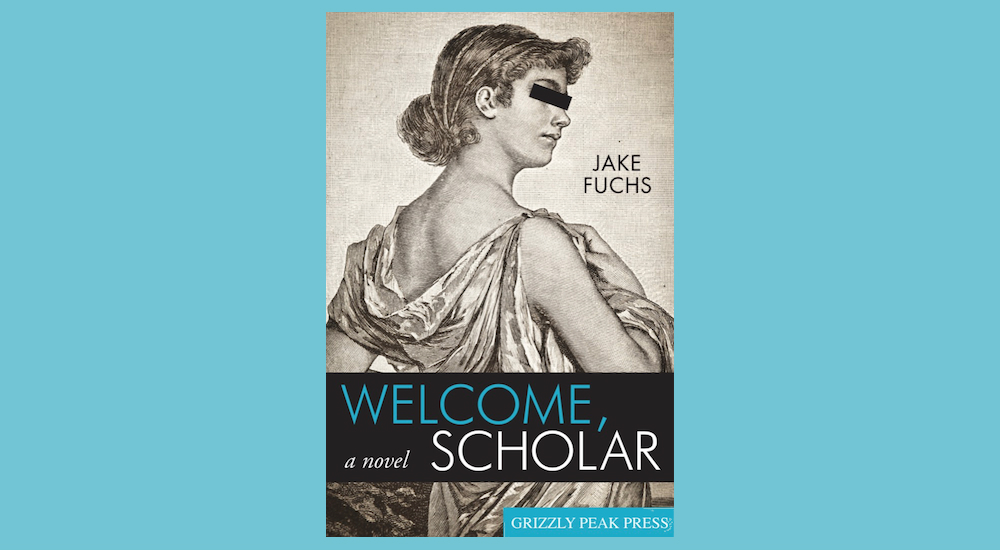Welcome, Scholar is an academic satire that alludes to the scholarly profession today but also, and substantially, to 18th-century British literature. The scholar of the title is Derek Rosenblum, who would like to teach the period, but is experiencing grave difficulty getting established as a professor. Rarely employed, he’s about 30 when we meet him.
I can’t say why I decided to write about Derek, because I didn’t decide on anything. One day I went down to my basement writing room, woke up my computer, and proceeded to type. At least I felt that I was typing rather than writing, because I was scarcely thinking. The words poured out. Now, when I open the book and look at the words, it’s as if someone else wrote them.
Was I possessed? I can’t rule that out, and the thought disturbs me a little. Derek is made similarly uneasy by the possibility of involvement with an agency not human. In his case, however, the fear is of persecution, not possession.
Derek has the Ph.D., but his graduate adviser insisted on his writing a dissertation on Laurence Eusden, the most obscure of all British poets laureate (1718-30). With this in hand, perhaps Derek should consider himself lucky if he lands an occasional gig teaching remedial composition. Gaining tenure somewhere, anywhere, is unthinkable. But he keeps trying. He writes an article about the little known Eusden. A journal accepts it and he has high hopes; but it has too little of the jargon required of critics and is generally ignored. So is Derek. He never gets a break; it goes beyond bad luck.
Eventually, inspired by hints both in dreams and waking life, Derek begins to wonder whether he isn’t being harassed by a goddess named Dulness, conceived in the fertile brain of Alexander Pope.
Dulness is the dimwitted, destructive divinity in the greatest of mock-epics, Pope’s Dunciad, which, though first published in 1743, is as relevant as ever. The same can be said of 18th-century works by Jonathan Swift and Samuel Johnson, but it is true of Pope’s writing above all, and, of all Pope’s works, especially of the Dunciad. How pleased I would be to witness a wholesale revival of this masterpiece of mordant wit, to see it shine its piercing beam upon today’s fools and frauds.
But this isn’t likely to happen. Unfortunately, today’s academicians tend to operate as Pope’s dunces do, focusing on parts and letting the whole escape. This reductive impulse is Dulness’s favorite weapon in her war against thought and light. In the Dunciad a “scientific” botanist proudly displays a solitary hothouse flower, ripped from what he calls “its humble bed” in nature. Botany is what he knows, not nature. A classicist opens Homer’s epics only to study individual words and even letters. Anything but the whole.
It seems to me that Dulness is real, in this sense. There is a power abroad that seeks to narrow everyone’s vision, so that none of us can see beyond our own tiny areas of concern. The rest goes unheeded, left in the dark. In his century Pope incarnated this malignant spirit in the form of a gigantic enthroned female, and that is the vision that possesses Derek. He is her prey, he decides, and what she seeks is to convert him from a reasonably conscious scholar, able to read and to write intelligibly, into one of her tapioca-brained disciples flooding into university English departments everywhere.
Why does she trouble herself with this marginal character? Because Derek is more important than he will ever understand. Everything rides on him. If he chooses to be dull, to turn dunce, a dire fate will befall English Studies — as if it didn’t have problems enough already.
In America, the teaching of literature and the writing of literary criticism were once dominated by something called the New Criticism. To the leading critics of the day, any piece of writing that deserved the adjective “literary” would have its meaning tidily packaged in its interior, hidden in the very words the acute reader must focus on and work through in order to find it. This approach influenced teachers and students until the 1960s, when the New became Old, replaced by post-structuralisms of different kinds, largely imported from France. The neat little package was revealed to be an illusion. Now the meaning of a text was thought to be forever in flux, and the reader became equal with (or superior to) the writer in keeping it astir.
Each of these styles of interpretation had its strengths and weaknesses, but both were fatally susceptible to the breaking down of wholes that Pope exposed in the Dunciad. Dulness seized her opportunity with the New Criticism and advanced further, much further, with post-structuralism. Great poems, great books were shattered into tiny warring fragments. Dulness, rejoicing, made everything worse by injecting into her acolytes the poison of jargon so unintelligible that soon it became difficult for one critic to be understood by any other. Soon it was a mark of honor not to be understood. Dulness invaded the classrooms as well as the journals, and the age-old goals of literature, to delight and to instruct, went underground. They haven’t surfaced yet.
Nor will they, if Welcome, Scholar is taken for prophecy, mediated through me in my basement. For Derek finally succumbs to the blandishments of Dulness, who confronts him in a stalled elevator at the annual meeting of the 18th Century Society. Willingly he becomes dull and is rewarded with a tenured job. Thus does English become the temple of the goddess.
What next? Perhaps Pope had the answer: And Universal Darkness buries All.


